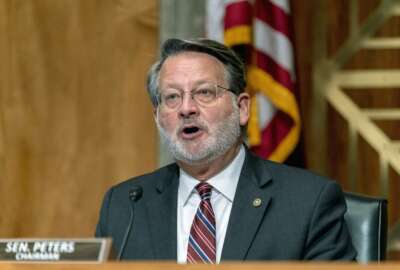If they’re ever confirmed, here’s what MSPB members will face
For what nominee will face should they be confirmed, Federal Drive with Tom Temin turned to the last MSPB member, attorney Mark Robins.
Best listening experience is on Chrome, Firefox or Safari. Subscribe to Federal Drive’s daily audio interviews on Apple Podcasts or PodcastOne.
As the month tick by, more cobwebs form in the offices of the Merit Systems Protection Board. More than five years have passed since the board has had a quorum, and nearly three years since any members at all. Meanwhile, the case backlog of aggrieved federal employees keeps growing. Appointees to the board are awaiting a Senate vote, nothing’s happening. For what they’ll face should they be confirmed though, Federal Drive with Tom Temin turned to the last MSPB member, attorney Mark Robins.
Interview transcript:
Tom Temin: Mark, good to have you back.
Mark Robbins: Thank you, Tom, it’s good to be back. I appreciate this opportunity.
Tom Temin: And review for us, when your term expired on the MSPB, at the time you were the only member and therefore still no quorum.
Mark Robbins: So my seven-year statutory term ended technically on March 1, 2019. We lost our quorum in early January of 2017, when former chair Susan [Tsui] Grundmann left. So I was on the board for a little over two years as the sole member.
Tom Temin: Alright, and I recall at the time you were working through the cases and making decisions on them, leaving them for what you presume would be a quorum at some point of two members.
Mark Robbins: That’s right. The way the board has traditionally worked is that cases come to the full board. And the files rotate between each of the members two or three. And we take our sequential turn adjudicating them, and then pass them along. And so for two years, I was technically first up on all the cases, and adjudicated them according to what I thought was the appropriate response. And then we put them into two separate offices, so that the two new members, eventually joining me would have 50% of the backlog to deal with. So in the two years before I left the board, I had adjudicated about 1,200 cases of the current backlog, which is I’m told close to 3,600. Now, my decisions are still in the files. But of course, there’s no legal holding to them. They might be persuasive to future members and they might not be but if anyone agrees with me, part of that work will be done for them.
Tom Temin: Got it. So then when there should be members, let’s presume the Senate will get around to confirming them, they go to the works, they’ll find literally piles of paper already waiting for them?
Mark Robbins: That’s right. Yeah, in fact, staff was having a problem trying to figure out where to put the files. Now, since I left, and thanks in part to the pandemic, a good portion of the MSPB’s workload has gone fully electronic, I’m told. So I’m not sure that there may be 3,600 physical files sitting around somewhere. But when I left, there were 1,200 physical files sitting around somewhere.
Tom Temin: And those files are more than just one or two sheets each, aren’t they? There’s a whole history of that case, because it had been heard by an administrative judge before it gets to the board for appeal, correct?
Mark Robbins: That’s exactly right. The files can be anywhere from a Redweld folder all the way to multiple banker’s boxes of documents, depending on how much evidence was submitted to the AJ below.
Tom Temin: You almost wish it was all paper just because of the satisfaction, the new members would have seeing that pile disappear.
Mark Robbins: That’s my thought. But I’m old fashioned when it comes to that kind of stuff.
Tom Temin: Alright, so they will walk in, but aren’t there also new cases coming in? In other words, what is their work likely to be like day to day, should these members get the job?
Mark Robbins: That’s exactly right. So according to the MSPB webpages, as I mentioned, there are about 3,600 cases in backlog right now. And if the new board whenever it gets there operates consistent with tradition for the board, that amount of cases would take about five years to process, just given the amount of staff and the time that the three new members are going to need to read through these files. But five years is a vacuum because there are new cases coming in and the new board will have to prioritize the import of new cases with those that have been in existence for up to five years. And of course, the three members operate autonomously, the chair doesn’t have a real ability to dictate what priority will exist for the backlog unless he or she can work with the other two to decide how they want to attack the backlog. Do they go first in first out? Do they do whistleblower cases first? Do they take cases where the employee was dismissed as an adverse action? You know, they’ll have a variety of choices they can make. But the new case is coming in. If OSC decides that it wants a stay of an adverse action pending an investigation that probably will take priority because it’s immediate.
Tom Temin: We’re speaking with attorney Mark Robins, former member of the Merit Systems Protection Board. And we should also point out you were general counsel of the Office of Personnel Management so you’re pretty well versed in federal employee issues. And if you look at say someone had been dismissed and they decide to take those cases first, then it’s possible that that person could have been dismissed six or seven years ago or longer by the time the case would have gotten to this empty office and then, if they take it up, then however long it’ll take to get to that case.
Mark Robbins: That’s exactly right. Now, with that amount of time, chances are the employee has moved on and has found other employment, which of course, will diminish whatever kinds of damages they can claim. But there are some escape hatches here to the lack of quorum. First, traditionally, about 80% of all cases filed with the MSPB are fully resolved at the AJ level. And the AJs are fully functional right now. AJs can be hired right now without the board being there, although the Supreme Court Lucia [v. Securities and Exchange Commission] decision has called into question the hiring of inferior officers of the United States. But the agencies are working, they’re processing the cases, and the 20% that come to the full board for an appeal, those employees have an opportunity to go directly to the Federal Circuit, if that’s the court of competent jurisdiction. Now, that’s expensive. It also immediately puts them in a forum where they need to follow federal rules, which is daunting for pro se litigants who are representing themselves and don’t – it’s easy to negotiate or relatively easy to negotiate the board’s process. When you get to federal court, it becomes much more complicated, obviously.
Tom Temin: And is there any way for the potential incoming board members to know which of those 3600 cases did go ahead and go to court? That is to say, would that automatically make them disappear from the MSPB docket?
Mark Robbins: Yes, my guess is the 3,600 already includes, or does not include those that have skipped the board. One open issue, when I was still there was whether a litigant who had filed with the board had already decided which path to take, and whether they could undo that by then just you know, pulling back from the board and going to the Federal Circuit. I’ll be honest, I have no idea how the board’s general counsel office of Appeals Council and clerk have resolved that.
Tom Temin: And if you look at this larger issue, it’s largely unknown to the general public. And maybe to the general public, it looks like, golly, just a crazy piece of bureaucracy for dealing with a million bureaucrats, what do I care? But on the other hand, you could look at it as a constitutional matter, and an injustice for one group of people that really, perhaps the nation shouldn’t be tolerating. How do you look at it?
Mark Robbins: Well, I’ve got an interesting perspective here. Clearly, the way Title V is drafted right now, the MSPB is part of the due process afforded to federal employees, federal retirees in certain cases, and family members. There is a philosophical thought that the MSPB should not exist because all of Americans have access to Article III courts to resolve their disputes. And why should federal employees be treated any differently? I would counter that by noting that these cases, if you were to abolish the MSPB, you’d have 2.1 million potential litigants filing in U.S. district courts around the country. Those cases would have to be defended, the government would be defended by the Justice Department by U.S. attorney’s offices, and it would just bog down the federal docket. So we do play a role not only in adjudicating for the federal workforce, but we save the federal government a lot of money in what we do.
Tom Temin: Any final advice for your unknown successors that walk into, I just I keep coming back to this image of walking into an office that hasn’t been used in years. And there’s a big pile of paper and a computer that you have to get the password for. What should they do first on the first day?
Mark Robbins: Let me begin by just saying I have full confidence in the president’s three nominees right now, Cathy Harris, Ray Limon and Tristan Leavitt. The two of them Ray and Tristan, I’ve known for years. And Cathy, I’ve had an opportunity to meet since her nomination. So I wish them all well. And I hope that their nominations can be moved expeditiously. In addition, my two former colleagues last time we had a full board, Susan Grundmann, Anne Wagner and I stand ready to help to any extent we can and they would deem appropriate the new members. But the first thing they’re going to have to do, and this has already been done by board staff is get an idea of what the topic of those 3,600 cases are in the backlog and then apply some form of priority, whatever it is they want to do, and then just go about it. But this is not a staffing problem. Those cases have been worked up by the staff. Literally the last step is for the three new members or two new members to make a quorum for them individually to sit down, read through the file and decide how they want the case to be adjudicated. So all the staff in the world can’t help that one individual read through those files. That’s something they’re going to have to do individually and get a good set of reading glasses.
Tom Temin: Attorney Mark Robbins is a former member of the Merit Systems Protection Board. Thanks so much for joining me.
Mark Robbins: Tom, thank you.
Copyright © 2025 Federal News Network. All rights reserved. This website is not intended for users located within the European Economic Area.
Tom Temin is host of the Federal Drive and has been providing insight on federal technology and management issues for more than 30 years.
Follow @tteminWFED






